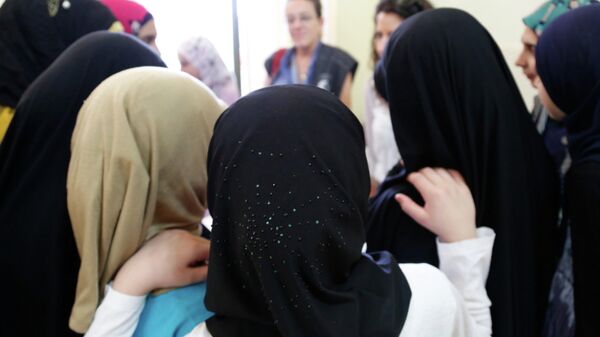The government of North Rhine-Westphalia in western Germany has faced mixed reactions after it announced plans to ban headscarves at schools for girls under 14, which split Angela Merkel’s Christian Democratic Union (CDU), as well as the local community.
Move Against Sexualizing Children
The legislation got vocal support among the leadership of the CDU, including deputy chairwoman Julia Klöckner and NRW minister president Armin Laschet.
"Children need free space, where there are no gender stereotypes, and the school should be such a place. I’m against both full veiling and headscarves for children," Klöckner said, cited by the local broadcaster ZDF.
Laschet also pointed out that the proposal gives children a chance to decide for themselves, which is why it's a good idea. The legislation falls in line with current German laws, according to which children are free to choose their religious beliefs from the age of 14.
The undersecretary in the state integration ministry, Serap Güler, who has a Muslim background herself, also strongly advocated for the ban, outlining her arguments in the recent interview with ZDF. She stated that the legislation aims to protect the best interests of children and doesn’t target a particular religion. She also dismissed the argument that the ban targets religious freedom pointing out that Islam demands that girls should cover their heads after they reach puberty so before puberty it isn’t about exercising one’s religion. Güler also pointed out that making little girls wear hijabs sexualizes them, as the purpose of covering one’s head is protection from seducing men. However, she emphasized that any girl’s own wish to put on a headscarf should be accepted and respected.
Germany's Teachers' Association also endorsed the idea. Its president, Heinz-Peter Meidinger, told the German tabloid Bild that a headscarf ban would help to prevent religious discrimination and bullying.
Muslim Community Alarmed
Meanwhile the planned prohibition faced strong opposition from Germany's Islamic Council, which slammed the idea for fueling "populist, highly symbolic and devoid of substance" discussions. The council's chairman, Burhan Kesici, dismissed the idea that Muslim girls are forced to wear headscarves en masse. According to the Bild newspaper, he admitted that there may be a small number of such children, but pointed out that it was "disproportionate and unconstitutional" for the state ban targeting “the religious freedom of all Muslim women.
"At the same time, the head of the Federal Anti-Discrimination Agency, Christine Lüders, stated that the ban would fuel discrimination at schools.
"Whoever wants to ban the Muslim headscarf at schools isn't solving any integration problems, rather they are contributing to students feeling marginalized and discriminated,” said she according to the DW website.
Helmut Holter, the Thuringian Minister of Education, representing the oppositional left-wing party Die Linke, also rejected a headscarf ban. He advocated for stronger democratic education at schools.
"All children should be able to develop into free and self-determined individuals," he told the Bild newspaper.
Veils of Contention
In 2017, the lower house of the German Parliament already barred face covering for civil servants in a package of security measures, claiming it “contradicts the neutrality of state functionaries." Last September, Germany also banned face veils for drivers, who are not allowed "to cover up or obscure their face so that it is no longer recognizable."
The recent German proposition also came hot on the heels of an announcement by the Austrian government, which presented its plan to ban headscarves for girls in kindergartens and primary schools across the country under the Children Protection Act. According to Austrian Education Minister Heinz Fassmann, the draft law, which was backed by Austrian Chancellor Sebastian Kurz and would go into effect this summer, is a "symbolic act."
READ MORE: All of Europe Should Copy Austria's Infant School Hijab Ban – AfD Official




